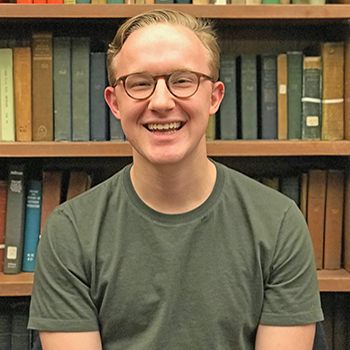 Name: Dustin Swonder
Name: Dustin Swonder
Class: 2019
Concentration: Applied mathematics (focus in economics)
Hometown: Richmond, Ind.
Internship focus: Economic research, public policy
Internship location: Office of Economic Policy, Washington, D.C.
Describe your internship.
I had a dual policy/research role. In particular, I updated oil forecasting models, wrote a research paper on government debt financing, and worked on a research project seeking to identify whether prescription opiate use has depressed labor force participation among prime-age workers. In my work on this last project, I started conducting research assistant duties, then worked as a co-author, and have now adopted the project as my thesis.
What is one of the most valuable lessons you learned from this internship, and why?
Coming up with a good research question is difficult. In particular, it’s difficult to disentangle literature, look at data, and decide definitively which questions you can answer.
What is one of the biggest challenges you faced during this internship, and why? How did you overcome it?
This summer was my first time working with a large survey data set, so I hadn’t had the experience before of searching through pages of documentation in order to find definitions of variables and changes in variables in different years of the data sets. Learning the documentation guides for the data set took a lot of perseverance.
What skills from your courses at SEAS helped you the most during this internship, and why?
My exposure to fundamental statistics was critical in my everyday responsibilities. I read technical papers and ran (lots of) regressions, and I drew on the skills I’d acquired through Introduction to Probability (STAT 110) and Introduction to Statistical Inference (STAT 111) in order to understand what I was doing.
Why has this internship been a good experience for you?
This summer was the first time I had the opportunity to work as a co-author on a project with a senior researcher. This was meaningful for me because, as anyone on the faculty here will point out, there’s a big difference between working as a research assistant and working as a researcher. In particular, I was grateful for the opportunity to make hard decisions about the direction of the project (e.g. which questions were we going to address?, which questions can we answer with the data we have in hand?, and what sort of analysis makes the most sense in the context of this project?)
How do you think this experience could inform or benefit your future career path?
As an intern in the Office of Economic Policy, I had the opportunity to work on well-defined, policy-relevant research projects with input from accomplished economists. In particular, the economists I work with struck a good balance between guiding me through research projects and giving me space to conduct my own research. My work this summer helped me sharpen and apply my econometric skills.
How did you find out about this internship?
The internship is posted on the economics department website.